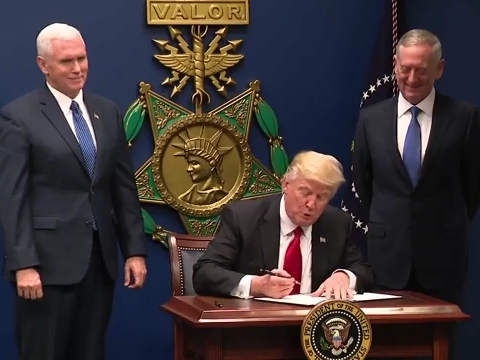
The Freedom From Religion Foundation today filed an amicus brief before the U.S. Supreme Court opposing the latest version of President Trump’s travel ban on immigration from several Muslim-majority countries.
Never in the history of the United States have our immigration policies and procedures been used to deny opportunity to religious groups and to favor a particular religion, FFRF asserts. The current administration’s orders and proclamation regarding a ban on travel targeting six majority-Muslim countries, motivated by the religious makeup of those countries, sullies that history. The purpose is to codify religious discrimination to further the myth that the United States is a Christian nation rather than a pluralistic society built on the hard work of immigrants and refugees of all religions and none at all.
The Trump administration’s history of excluding from entry to the United States immigrants and non-immigrants from selected majority-Muslim countries violates the Establishment Clause of the First Amendment, which FFRF works to protect and defend. FFRF notes that the order’s underlying purpose is religious: to ban a religious minority (Muslims) and to favor Christians. The brief also makes the contention that the travel ban contravenes Article VI of the U.S. Constitution, which prohibits a religious test for office or public trust. It would create precedence that could be used to target not only religious minorities, but also the significant minority today that identifies as nonreligious.
“We can’t have religious favoritism and discrimination become the basis of immigration policymaking,” says FFRF Co-President Annie Laurie Gaylor. “This contravenes everything this country has stood for throughout its history.'”
The order is not tailored to address the president’s supposed purpose, FFRF maintains. Less than a quarter of Muslim-Americans involved in violent extremism of any kind have family ties to the six countries designated in the order.
For over a year, the Trump Administration has engaged in a campaign of religious discrimination and favoritism that will not stop until the Supreme Court unequivocally strikes down its religious purpose as unconstitutional. Trump has never recanted calling his immigration policy a “Muslim ban,” and he has never disavowed such a purpose when issuing the original and follow-up orders.
In a Jan. 27, 2017, interview with the Christian Broadcasting Network, Trump confirmed his intent to prioritize Christians in the Middle East for admission as refugees:
If you were a Muslim you could come in, but if you were a Christian, it was almost impossible and the reason that was so unfair — everybody was persecuted, in all fairness — but they were chopping off the heads of everybody but more so the Christians. And I thought it was very, very unfair. So we are going to help them.
After issuing his second executive order on the ban, Trump stated, “[p]eople, the lawyers and the courts can call it whatever they want, but I am calling it what we need and what it is, a TRAVEL BAN!” He also described the second order as a “watered down version of the first order,” which had been found unconstitutional by the 4th and the 9th U.S. Circuit Courts of Appeal. (FFRF filed an amicus brief in those cases that were before the Supreme Court last fall, as well.)
Trump issued his third executive order on Sept. 27, 2017, which contained the same travel ban intent as in the first two orders. He repeatedly linked the current executive order to previous orders, calling it a “larger, tougher, and more specific” ban.
Trump’s statements show that each of the travel ban orders was motivated by a desire to give preference to one favored religion and to discriminate against unpopular religious minorities.
The Freedom From Religion Foundation, a national nonprofit organization based in Madison, Wis., is the largest U.S. association of freethinkers, representing over 32,000 atheists, agnostics, and other freethinking American citizens.
FFRF’s lead counsel for the amicus brief is its Legal Director Rebecca Markert. The state/church watchdog wants to thank Immigration Law Attorney Huma Ahsan for approaching it about the brief last year and inspiring it to get involved, and Russell Busch, a 2017 summer law clerk with FFRF from the University of Michigan, who also helped with research and drafting different iterations of this brief.

